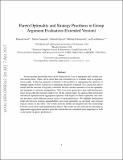Pareto optimality and strategy-proofness in group argument evaluation
Author(s)
Awad, Edmond; Caminada, Martin WA; Pigozzi, Gabriella; Podlaszewski, Mikołaj; Rahwan, Iyad
DownloadAccepted version (755.7Kb)
Terms of use
Metadata
Show full item recordAbstract
An inconsistent knowledge base can be abstracted as a set of arguments and a
defeat relation among them. There can be more than one consistent way to
evaluate such an argumentation graph. Collective argument evaluation is the
problem of aggregating the opinions of multiple agents on how a given set of
arguments should be evaluated. It is crucial not only to ensure that the
outcome is logically consistent, but also satisfies measures of social
optimality and immunity to strategic manipulation. This is because agents have
their individual preferences about what the outcome ought to be. In the current
paper, we analyze three previously introduced argument-based aggregation
operators with respect to Pareto optimality and strategy proofness under
different general classes of agent preferences. We highlight fundamental
trade-offs between strategic manipulability and social optimality on one hand,
and classical logical criteria on the other. Our results motivate further
investigation into the relationship between social choice and argumentation
theory. The results are also relevant for choosing an appropriate aggregation
operator given the criteria that are considered more important, as well as the
nature of agents' preferences.
Date issued
2017Department
Massachusetts Institute of Technology. Media LaboratoryJournal
Journal of Logic and Computation
Publisher
Oxford University Press (OUP)